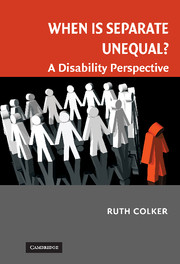Book contents
- Frontmatter
- Contents
- Preface
- Acknowledgments
- 1 Introduction
- 2 Anti-Subordination Above All: A Disability Perspective
- 3 The Mythic 43 Million Americans with Disabilities at the Workplace
- 4 K–12 Education
- 5 Higher Education and Testing Accommodations
- 6 Voting
- 7 Reflections on Race: The Limits of Formal Equality
- Index
4 - K–12 Education
Published online by Cambridge University Press: 05 June 2012
- Frontmatter
- Contents
- Preface
- Acknowledgments
- 1 Introduction
- 2 Anti-Subordination Above All: A Disability Perspective
- 3 The Mythic 43 Million Americans with Disabilities at the Workplace
- 4 K–12 Education
- 5 Higher Education and Testing Accommodations
- 6 Voting
- 7 Reflections on Race: The Limits of Formal Equality
- Index
Summary
In chapter 3, i argued that congress correctly adopted an anti-subordination approach in defining who should be covered by the Americans with Disabilities Act but that the courts have undermined that intention through an exceedingly narrow interpretation of the term disability. Consequently, ADA Title I has been ineffective in improving the employment opportunities of individuals with disabilities who are qualified to work with or without reasonable accommodations. Because the courts disallowed claims of discrimination altogether by concluding that the plaintiffs were not even covered by the statute, that chapter did not discuss whether the remedies adopted by the courts were effective under an anti-subordination perspective.
The problems with legal protections for children with disabilities who desire an effective education are quite different from the problems faced by adults with disabilities who desire employment. As under the ADA, Congress used an anti-subordination approach in defining the scope of the covered class in the education area. Only children who meet the definition of disability are covered by the relevant federal statute – the Individuals with Disabilities Education Act (IDEA). Congress used different definitions of disability under the IDEA and the ADA. On the whole, the definition adopted by Congress under the IDEA is appropriate and consistent with an anti-subordination approach. Further, the courts have generally interpreted the IDEA consistently with Congress's intent, so the statute does offer protection to many children with disabilities. Hence, this chapter will not offer an extensive critique of Congress's or the courts' decisions with regard to the scope of coverage.
- Type
- Chapter
- Information
- When is Separate Unequal?A Disability Perspective, pp. 78 - 140Publisher: Cambridge University PressPrint publication year: 2008



